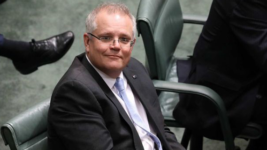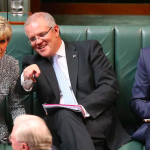Morrison Moves to Silence Trade Unions

The Liberal Nationals government delivered on prime minister Scott Morrison’s post-election promise to crack down on trade unions, when it reintroduced the Ensuring Integrity Bill into the lower house of parliament on Thursday.
Having stalled last year with a lack of crossbench support in the Senate, after its initial introduction in 2017, the Ensuring Integrity Bill provides government and other parties with enhanced powers to not only meddle in union affairs, but get leaders sacked and shut down worker organisations as well.
Newly-incumbent industrial relations minister Christian Porter told the AFR that the “integrity” laws were needed, so the government could deregister a union like the Construction, Forestry, Maritime, Mining and Energy Union (CFMMEU) over its “extraordinarily high standard of unlawful activity”.
Deregistering the CFMMEU is a threat that the PM already made last September soon after he took office. The union is currently reeling from the fallout caused by a scandal around comments made by and charges laid against CFMMEU Victorian secretary John Setka.
However, the push to tighten restrictions around unions comes at a time of record wage stagnation, which has been linked to declining strike action in a country that already has some of the most restrictive industrial laws in the developed world.
A concerted attack on workers
“The Ensuring Integrity Bill would give the minister, employers, or any other party with a sufficient interest the power to intervene in the running and work of unions, disqualify people from union leadership, block union mergers and deregister unions,” said ACTU president Michele O’Neil.
The legislation “adds to what is already a highly regulated union movement and goes further than any other western democracy in interfering in democratic workers’ organisations”, she further told Sydney Criminal Lawyers.
The Australian Council of Trade Unions boss explained that workers’ rights to organise and run their own unions are internationally recognised. And just like the free press in this country, a free trade union movement is essential to keep checks on “the powerful”.
As far as Ms O’Neil is concerned, the Morrison government should be turning its attention towards low wage growth and halt cutting penalty rates. However, instead of looking after working people, the government is increasing attacks upon them and stripping away their rights.
“Every single worker benefits from the work of unions,” Ms O’Neil added, “attacking unions is another way of attacking every worker’s rights.”
The integrity laws
Schedule 1 of the Ensuring Integrity Bill 2019 amends the Fair Work (Registered Organisations) Act 2009 (the Act), so that the circumstances in which a person can be automatically disqualified from holding a position of office are broader. And if they don’t vacate, it’ll be a criminal offence.
These provisions include a “fit and proper” test as grounds for disqualification. And the changes also provide for the minister, the Registered Organisations Commissioner or “a person with sufficient interest” to apply to the Federal Court for an order to disqualify a person from holding office.
According to the bill’s explanatory memorandum, “’sufficient interest’ has been judicially interpreted as an interest beyond that of an ordinary person and includes those whose rights, interests or legitimate expectations would be affected by the decision”. Perhaps an employer.
Schedule 2 amends the Act, so as to “streamline” the cancellation of union registrations by the Federal Court. New section 28 provides that the minister, the commissioner or that person with a sufficient interest can apply with the court to see a union deregistered.
And it also provides that these parties can apply for “alternative orders” that intrude on the way unions run internally. These orders include disqualification of certain officers, exclusion of certain members and the “suspension of right, privilege and capacity”.
Schedule 3 expands the circumstances in which parties can apply to the court so an administrative scheme can be imposed on a union. As the ACTU has pointed out this is much broader than similar provisions that deal with corporations and it’s designed to punish rather than assist.
And the final schedule of the union-busting bill makes amendments in regard to unions amalgamating, which, as the ACTU put it, “allows for unprecedented political and industry interference in the democratic operation of industrial organisations”.
Suppressing industrial action
The Australian Resources and Energy Group has welcomed the government’s move to reintroduce the integrity legislation, stating that it’s “necessary to disincentivise law-breaking and remove recidivist offenders from holding positions of office”.
However, with Australia having some of the strictest laws around conducting industrial action in the western world, it would seem that at times workers might need to break stifling laws in order to get their message across.
The mounting restrictions around strike actions include prohibiting them being conducted during an enterprise agreement, full disclosure of the nature and timing of actions, a prohibition on sympathy strikes, limits on strikers’ speech, and the authority to prohibit actions affecting public services.
Indeed, ACTU secretary Sally McManus caused a stir a few years back, when she stated that she had no problem with workers breaking laws which are “unjust”. And McManus has also made clear that current industrial laws and regulations are set up to benefit employers.
Industrial action in this country is at the lowest it has been during the post-war era, with strikes down by 95 percent since the 1970s. And it’s been suggested that the lack of work stoppages has led to extremely slow wage growth. This decade has seen the slowest growth since the last world war.
The continuing assault
The Morrison government needs the support of four of the six Senate crossbenchers to get the bill – which is opposed by Labor and the Greens – passed. Independent Cory Bernardi and the two One Nation senators will support it. And it’s thought it will also rely on the vote of Jacqui Lambie.
The PM announced last week that his government is also launching a review of Australian industrial laws, which will be headed by minister Porter. And it’s thought this big business focused inquiry will result in further legislation that erodes workers’ rights.
Scott Morrison insisted his government had no plans to reduce workers’ rights during the election campaign, Ms O’Neil concluded. “Now we see the truth, he has called on business to deliver his minister a wish list and has dusted off previously failed legislation to attack unions.”







